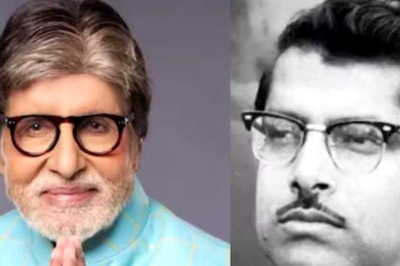
views
GENEVA: World Trade Organization negotiators have failed to reach a deal by a year-end deadline to cut subsidies that lead to overfishing, the chairman of the talks told delegates at a closed-door meeting on Monday.
Colombia’s Santiago Wills said it had been impossible to reach the U.N. target due to time lost due to the coronavirus pandemic, two sources at the meeting told Reuters. However, Wills said that a deal had been closer than ever, and that the “tremendous” progress gave him confidence in a future deal.
World leaders committed in 2015 to a series of U.N. targets and one of them mandates the Geneva-based trade watchdog to strike a deal on ending government subsidies worth billions of dollars that contribute to over-fishing by 2020.
China, the European Union, the United States, South Korea and Japan are among the main subsidisers.
The failure is a significant blow to the world’s fish stocks, since environmentalists say an ambitious deal could reverse a steep decline, and to the WTO, which faces questions about its ability to strike multilateral agreements.
“It is disappointing,” said Remi Parmentier, strategic adviser for Friends of Ocean Action, who has been an environmental advocate at the WTO for two decades.
“They have had 20 years to fix it and on certain issues they are still almost at square one.”
The U.N. food agency has said that nearly 90% of marine fish stocks are fully exploited, overexploited or depleted. U.N. Secretary General Antonio Guterres and Britain’s Prince Charles have both urged action at the WTO.
The Pew Charitable Trusts estimates that an ambitious deal could lead to a 12.5% increase in global fish biomass by 2050, based on a model it shared with negotiators.
“If countries reach an agreement on harmful fishing subsidies that keeps loopholes to a minimum, they will achieve a conservation victory that could have a long-lasting, positive impact on our global ocean,” said Isabel Jarrett, manager of Pew’s project to end harmful fishing subsidies.
“OH, DEAR FISH”
Delegates praised bridge-building efforts by Wills, who had shown his commitment to the talks in an unexpected way by tweeting a Valentine’s poem to the world’s fish: “Oh dear fish/Protect you we must;/In the @WTO/You can trust…”
Negotiators had been working on a confidential draft text for months but a November copy seen by Reuters still contained dozens of areas of disagreement.
A major area of contention has been a section outlining carve-outs from the rules for developing countries, submitted by India. One delegate from a wealthy country said these were so broad as to render the agreement meaningless.
Since China is the biggest subsidiser and has in the past resisted pressure to curb its fleets, the talks’ success is seen as hinging partly on Beijing’s willingness to make concessions.
Some expressed frustration at China’s opposition to a provision targeting exploitation of the high seas by industrial fishing fleets.
China’s ambassador said in September that such a prohibition “would go beyond our mandate”. But Beijing has said it is willing to “fully engage” and a spokeswoman in Geneva declined to spell out its current position.
The absence of a WTO director-general also played a part the talks’ failure, since he or she would ordinarily be able to help clinch a deal, Wills said.
Brazil’s Roberto Azevedo stepped down early in August and a candidate selected by a WTO panel to replace him was blocked by Washington.
Future progress on fisheries may depend on whether a two-yearly meeting of trade ministers, scheduled for last June in Kazakhstan but cancelled due to COVID-19, can be resurrected.
Disclaimer: This post has been auto-published from an agency feed without any modifications to the text and has not been reviewed by an editor
Read all the Latest News, Breaking News and Coronavirus News here

















Comments
0 comment